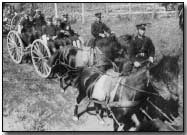Battles - The Siege of Tsingtao, 1914
 Although actually in China Tsingtao (Qingdao
today) was leased to Germany as a colony by the Chinese government in the
wake of the murder of two German missionaries in the late 19th century.
In order to appease the German government following the two deaths China
granted Germany a 99-year lease on the colony in 1898.
Although actually in China Tsingtao (Qingdao
today) was leased to Germany as a colony by the Chinese government in the
wake of the murder of two German missionaries in the late 19th century.
In order to appease the German government following the two deaths China
granted Germany a 99-year lease on the colony in 1898.
Germany subsequently built a port and naval base at Tsingtao, establishing it as the main German installation in the Far East. Tsingtao was consequently garrisoned by some 4,000 troops.
However on 16 August 1914, a full week prior to the formal Japanese declaration of war with Germany, General Mitsuomi Kamio was instructed by the Japanese government to make advanced preparations for the siege of the German-controlled port.
The day prior the Japanese Prime Minister addressed an ultimatum to the German government, ordering the latter to remove German men-o'-war from Japanese and Chinese waters, and to hand over Tsingtao to Japanese control. (Click here to read Minister for Foreign Affairs Baron Kato's rationale for war with Germany.)
Thus on 2 September 1914, shortly after war was declared by the Japanese, Kamio's 18th Division of 23,000 men backed by 142 guns began a bombardment of the port. Britain, wary of Japanese intentions in the region, decided to send 1,500 troops to assist the Japanese (and to keep a watchful eye upon proceedings).
The Germany garrison, despite being outnumbered by some six to one, held out for over two months before finally surrendering on 7 November and handing over the port three days later. Kamio's siege tactics were much admired for their effectiveness; he advocated night raids and eschewed frontal attacks of the type shortly witnessed along the battlefields of France and Flanders. With the port's capture British forces were withdrawn and reallocated elsewhere.
Following Chinese acceptance of Japan's Twenty-one Demands of January 1915 (agreed four months later) - issued upon pain of war - Tsingtao returned nominally into Chinese hands but did not in fact revert to Chinese control until 1922.
Click here to read a German newspaper reaction to the loss of Tsingtao.
A "Grand Slam" was British slang for an impending attack or battle.
- Did you know?
